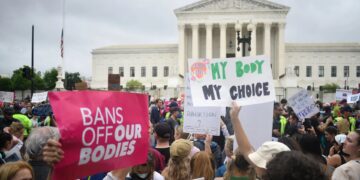By Hank Beckman -
The 75th Anniversary of the United States use of atomic bombs on the Japanese cities of Hiroshima and Nagasaki arrived amid a continuing movement to outlaw nuclear weapons.
The International Campaign to Abolish Nuclear Weapons (ICAN), a Nobel-prize winning nonprofit based in Australia, recently announced that three additional states had ratified the United Nation’s Treaty on the Prohibition of Nuclear Weapons, bringing the total to 44 member states approving the 2017 treaty. Once 50 members ratify, the treaty becomes binding.
The challenges yet to be addressed by the treaty are several and daunting.
Among them are:
-How will actual denuclearization be accomplished? The treaty appears to be a gradual effort, with subsequent negotiations required to eventually rid the world of nuclear weapons. The UN web site states that the the TPWN will “enter into force 90 days” after the fiftieth state ratifies it. So how is it “binding” as advertised if further negotiations are needed?
—If binding, what effect would it have on the 1970 Treaty on the Non-Proliferation of Nuclear Weapons (NPT), which, in theory, already mandates that all signatories work toward a nuclear-free world? Is TPNW just restating NPT principles or will the two treaties result in conflicts among signatories?
-How will any treaty be effectively enforced? The TPWN calls for no verification regime, allowing each state to police itself. The history of arms control treaties doesn’t inspire confidence.
The Washington Naval Treaty of 1928 sought to limit warships, but the Japanese and Italians simply walked away from it in the 1930s; similarly, the Germans opted out of the Treaty of Versailles arms limitations when it suited Hitler; modern times, the Obama administration revealed that the Russians had violated the 1987 INF Treaty; North Korea was caught cheating on the Agreed Framework negotiated by the Clinton Administration; the Chemical Weapons Convention was ratified almost 20 years ago by all but four nations, yet chemical weapons still exist and have been used, most recently in Syria.
And treaties, by definition, are only binding on state actors. How does that protect nations against terrorist groups with nukes or conventional weapons?
But even if, against all reasonable expectations, the world community actually does somehow succeed in abolishing nuclear weapons, it still doesn’t address the problem of liberal states defending against dictators equipped with significant armies/navies/air forces and huge stockpiles of conventional weapons.
While nuclear annihilation is the ultimate danger in modern war-making, conventional weapons, even those of relatively ancient vintage, are no day at the beach, having been responsible for the deaths of millions worldwide.
Estimates vary, but the First World War butcher’s bill came to about 15-22 million, depending on the source. The Second World War ended only after 70-85 million people perished, many of them civilians. And those estimates are only of fatalities, not total casualties.
Whatever the challenges of nuclear weapons are, and they are obvious and serious, it is a matter of historical record that the second half of the 20th century was significantly less bloody than the first half, and the existence of nuclear weapons helped reduce the death toll.
The threat of exposing their populations to nuclear attack has given any number of leaders reason to think twice before launching military adventures in the modern era.
It is not a coincidence the Soviet Union never attempted to invade Western Europe after the war. Historians differ on what Stalin’s long-range plans were, but no one disputes that the Soviet leadership thought a war with the capitalist West inevitable; failing to hold free elections in Poland, establishing Communist regimes in several Eastern European nations and serious espionage in Western countries left no doubt about their intentions.
But the American nuclear umbrella protecting our allies in Europe made any aggressive Soviet moves potentially disastrous. Then during the Suez Crisis of 1956, President Eisenhower warned the Soviets that if they staged an atomic attack on our European allies, “Moscow would be destroyed as surely as night follows day.” The American nuclear deterrent was a prime factor in the Soviets not signing a separate peace treaty with East Germany in the early 1960s and freezing the West out of that Berlin.
The threat of nuclear war convinced Nikita Khrushchev to dismantle his ballistic missiles during the Cuban Missile Crisis. Leonid Brezhnev similarly backed down during the 1973 Yom Kippur War when Richard Nixon went to a full nuclear alert to signal to the Soviets that we wouldn’t let Israel be annihilated.
In many situations, a nuclear deterrent also served to prevent aggressive actions from even being considered.
The Warsaw Pact might have far more troops and tanks than the NATO countries, but NATO could counter with nukes. Experts differ on when Israel first acquired nuclear weapons—they still don’t officially admit their existence—but many place it somewhere in the late 1970s and 1980s. It wasn’t only the Camp David Accords that stopped Arab nations from routinely invading the world’s only Jewish state; many weren’t even signatories to the treaty. But Arab leaders now had to consider the loss of entire cities if Israel’s existence was threatened.
The deterrence value of nuclear weapons is certainly recognized by the leaders of dictatorships. Why else would North Korea and Iran covet nuclear weapons? It cannot have escaped the notice of Kim Jong-Un and the Iranian mullahs that Iraq was invaded before Saddam Hussein could develop nukes and Muammar Gaddafi was hunted down, raped and slain in the desert after he willingly gave up his nuclear program. (The worst decision in a lifetime of bad ones)
So even bad actors can be said to employ nuclear weapons for legitimate defense purposes. But if all the nations of the world actually do eliminate them, that will still leave the problem of those bad actors with significant conventional weapons.
And liberal states will always be at disadvantage in any arms competition, whether conventional weapons or Weapons of Mass Destruction. Democracies have to pay at least some attention to the sentiments of their populations. At various points in the Cold War, the populations of the West signaled though elections or polling (or civil disobedience) that the cost of maintaining huge defense budgets came at too steep a price.
Dictators like Vladimir Putin, Kim Jong-Un and Xi Jinping are under no comparable pressure from their populations to moderate defense spending. There are no peace movements likely to influence any serious strongman—or even survive, in some cases.
Kim in particular has demonstrated that he’s perfectly willing to starve his population to achieve his military goals.
Analysts differ on whether the long term cost of maintaining a nuclear deterrent is really any cheaper than national security based on conventional weapons; maintaining a nuclear posture doesn’t come cheap.
But politicians typically budget in the short term, with an eye on what pleases the voter. If voter sentiment at a particular time is for reduced defense budgets, that’s the policy that politicians and political candidates tend to lean toward. That’s a reality that can’t be denied, unless one is proposing taking defense policy out of the hands of civilian leaders and giving military leaders the discretion to set defense budgets, an idea no one should favor.
And certainly the nuclear deterrent provides a quicker response in times of crisis. Would it really have been practical, both politically and strategically, for Richard Nixon to rely solely on conventional arms to counter the Soviets during the Yom Kippur War? The answer is obvious.
Make no mistake, the idea of a world without nuclear weapons is not just the goal of a largely anti-American United Nations or utopian peace activists; statesmen like George Schultz, William Perry and Henry Kissinger are on record in favor of nuclear disarmament. Even Ronald Reagan, no one’s idea of a dove, envisioned a world without nuclear weapons.
While denuclearization is obviously not going to occur the day after tomorrow, committing to a policy as momentous as global denuclearization might spark momentum that future leaders might not be able to resist.
Our elected leaders have a legal and moral obligation to provide for our national defense. Until they come up with a solid plan for countering conventional weapons, they shouldn’t even consider nuclear disarmament.







